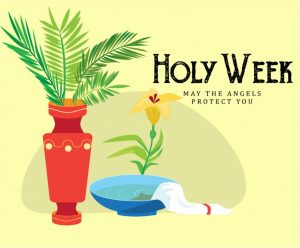 This is our Second Easter, in Lockdown. As restrictions continue, our television rooms have now become the place where we can participate in Mass, say our prayers and receive spiritual communion. However, despite the enormous challenges of the last year, there is light at the end of the tunnel. Thank God, for the gift of science, and as the acceleration of vaccination takes place, soon we will be in a much brighter place.
This is our Second Easter, in Lockdown. As restrictions continue, our television rooms have now become the place where we can participate in Mass, say our prayers and receive spiritual communion. However, despite the enormous challenges of the last year, there is light at the end of the tunnel. Thank God, for the gift of science, and as the acceleration of vaccination takes place, soon we will be in a much brighter place.
This Palm Sunday, we begin Holy Week, seven days, filled with Religious Symbolism and Rituals, from Washing Feet to Venerating the Cross. Holy Week, is indeed a true gift to embrace.
Holy Week, tells the very hopeful story of Jesus’ great love and resilient compassion. A free love, given in an absolute fashion. A love, told powerfully by a God who “lay down his life for his friends”.
For this reason, the days of Holy Week resonate with many emotions felt within all our hearts. The joy and intimacy at a family meal, the pain of not knowing our future, the emptiness, because of a loved ones death and the transforming hope and joy on Easter Sunday; Jesus risen from the dead.
This is a powerful story, a story that through the symbol of a cross continues to offer hope.
We All Have Crosses. When we look at the call to take up our cross, we tend to think of the way God asks us to accept and embrace the sufferings and hardships that come from living in this fallen world. While we have a difficult time understanding why a good God allows his people to suffer, we all know what suffering feels like, and we can understand how it can be linked to the cross.
This kind of suffering can be physical or spiritual or psychological. It can range from cancer to the inner wounds caused by someone who persecutes you because of your faith. It can come in the form of addiction, depression and anxiety.
It can come from our standing up for innocent life in a culture of death, or it can come from having to endure the pain of a broken relationship. Whatever its source, we all have situations in our lives that we could honestly call “crosses” that we have to bear.
It is important to see, however, that before we accept or embrace any cross we may encounter, we should feel free to ask the Lord to remove it from us. Yes, Jesus told us to carry our crosses. But at the same time he himself healed many people.
He removed their crosses because of his love and compassion. Just as Jesus removed the crosses from these people, there are many instances where he wants to remove ours. He knows all about our suffering, and he is with us. He loves to heal us.
One of the great models of the church in the Second Vatican Council is that of the church being a living dynamic community of faith “the people of God”.
This week Jesus reminds us all that essentially our church is local; familiar places where we share meals, support and encourage. “Where two or three are gathered in my name, I am with you”. Jesus continues to wash our feet through the hands of parents, caring for their family, voluntary organisations who support often the most vulnerable in our society.
Jesus in Gethsemane reminds us that we are not alone. His fragile and very vulnerable experience of doubt, frustration and extreme anxiety is a powerful solidarity with so many who are uncertain and overwhelmed.
Jesus dying on the cross is an invitation to new life. His kingdom is not for those who have it all, but firstly, for those who are in want of something greater. His word to a dying thief – “Today you will be with me in paradise”.
His dying arms outstretched are an invitation to all people to turn to his love. Jesus on the cross embraces the depth of our humanity and in doing so makes us new and powerful. “By his wounds we are healed”. Without the cross we have no Easter. It is through suffering; Jesus gives us Easter – Hope.
The Prayer of Abandonment, written by Blessed Charles de Foucauld, is one of the most beautiful prayers of surrender in the Christian spiritual heritage.
Father
I abandon myself into your hands; do with me what you will.
Whatever you may do, I thank you:
I am ready for all, I accept all.
Let only your will be done in me, and in all your creatures.
I wish no more than this, O Lord.
Into your hands I commend my soul; I offer it to you,
with all the love of my heart, for I love you, Lord,
and so need to give myself, to surrender myself into your hands, without reserve, and with boundless confidence,
for you are my Father.
